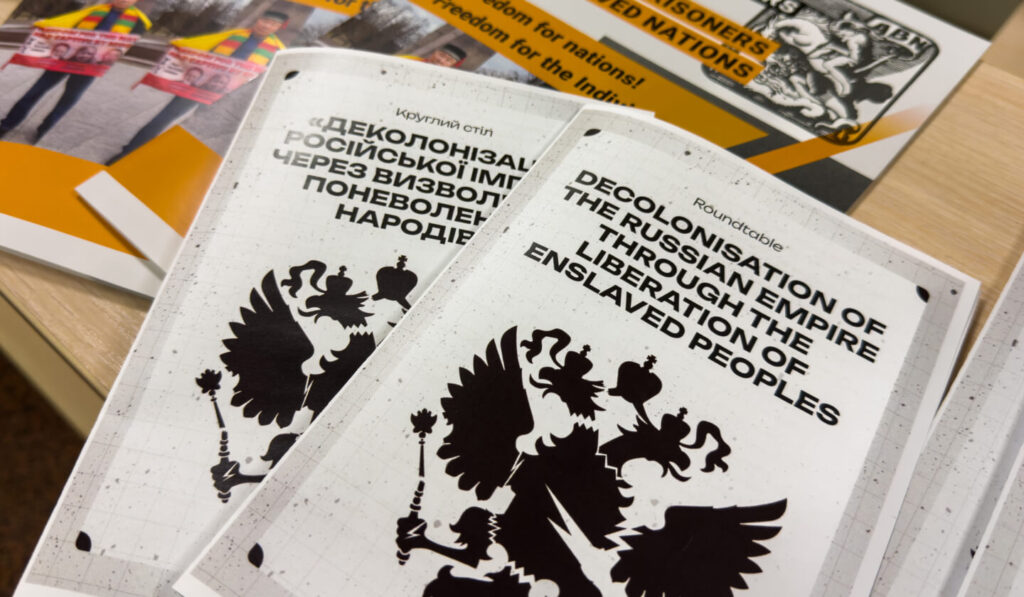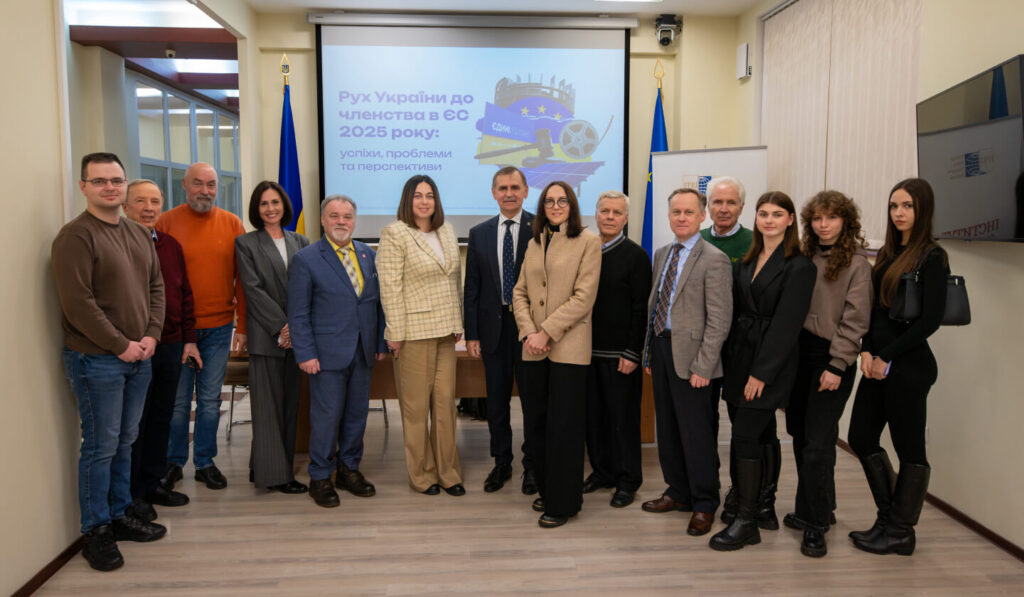On Thursday, 14 November 2024, the GDIP Media Сenter hosted the presentation of the International Human Rights Advocacy Project titled ‘putin’s Real Prisoners. Political Prisoners among the Captive Nations’.
The Anti-Imperial Bloc of Nations international NGO organised the event with assistance from the Directorate-General for Rendering Services to Diplomatic Missions. The presentation, which supported offline and online participation, was a success.
The project’s goal was to draw the attention of the global community to the issue of the political repressions against representatives of national liberation movements of the captive nations who fell victim to the persecution and unlawful imprisonment by putin’s regime, as well as mobilise international support towards freeing political prisoners, prosecuting those responsible for human rights violations and bringing them to justice for the involvement in repressions and torture.
The exhibition under the ‘putin’s Real Prisoners. Political Prisoners among the Captive Nations’ comprised 12 stories of representatives of the captive nations and Crimean Tatar political prisoners, including Zarema Musaeva, Altan Ochirov, Natalia Filonova, Aikhal Ammosov, Airat Dilmukhametov, Parvinakhan Abuzarova, Fail Alsynov, Aleksandr Gabyshev, Zarifa Sautieva, Andrei Vasyurenko, Asan Akhtemov, and Raif Fevziev. These individuals’ stories are but a glimpse into the fates of around ten thousand more of the kremlin’s political prisoners and prisoners of war, who have been under illegal detainment or imprisonment in the territories of russia, Belarus, Crimea, and the so-called DPR and LPR. They all are putin’s real prisoners also. First and foremost, it’s Ukrainian prisoners of war: the Azov fighters and other heroic defenders of Mariupol, protectors of dozens of Ukrainian towns and villages. Their list also includes representatives of many freedom-loving peoples who volunteered to fight in the ranks of the Ukrainian army: Georgians, Belarusians, and others. There are over 600 members of the Ukrainian Armed Forces against whom russia has initiated illegal criminal proceedings and pseudo-trials. The invaders brutally torture prisoners of war. The prevalence of torture in russian captivity is constant and systematic. Besides soldiers, putin’s prisoners are also civilians: public activists, journalists, human rights advocates, members of the Ukrainian resistance, Ukrainian clergy, and just ordinary citizens. A special mention goes to Ukrainian children, stolen by russia. The issue of kidnapped Ukrainian children is one of the war’s most dire humanitarian problems. In total, there are currently over a million Ukrainian children under russian occupation.
The presentation began with the opening speeches of its moderator, Oleh Vitvitskyi, who is the Executive Director of the Anti-Imperial Bloc of Nations, and Oleh Medunytsia — President of the Anti-Imperial Bloc of Nations and a People’s Deputy of Ukraine of the 7th and 8th convocations.
‘Today, on behalf of the Anti-Imperial Bloc of Nations, we would like to become the voice of these captive people and convey truth to Ukraine and the whole civilised world about the repressions and the unlawful plight imposed on the representatives of these peoples. Our exhibition displays 12 panels: ten of them tell the stories of representatives of the captive nations, and the remaining two are about Crimean Tatar political prisoners. The Crimean Tatars also became temporarily captive people, the same as the Ukrainians who fell under temporary occupation and have been kept in the muscovite prisons. These stories are about representatives of different peoples, men and women, experienced leaders of liberation movements and simple activists of public and political organisations alike. Our main objective today is to help these people and hundreds of other prisoners of the kremlin walk free, whether through prisoner exchanges, acquittals (although they are virtually impossible), or international resonance’,
Oleh Vitvitskyi said.
The project’s founder, Oleh Medunytsia, spoke about the history behind the project, which can be traced back to 1943, and its reestablishment in the modern period, as well as described the event’s ideological message:
‘This exhibition is about the tragic fates of specific individuals and entire ethnic groups, who were at one point subjugated by russia. Indeed, the soviet union was a prison of nations. Now, the largest such place of imprisonment of nations is the russian federation. That’s exactly how we should refer to it because russia is a prison of entire ethnic groups and small nations it has subjugated, whose representatives are currently kept in prisons. And it’s not a given that it will ever release them. Per different estimates, there are between 6 and 7 thousand political prisoners in russia. Nearly half of them are representatives of the captive nations. Our goal is to draw attention to those people. They terrify russia — and putin himself — because those people threaten the existence of the quasi-state known as the russian federation. Our duty as an organisation belonging to a global movement is to ensure those people aren’t abandoned, help them get out of prisons and continue their national liberation races, and bring about russia’s collapse.’
The event also featured speeches by People’s Deputy of Ukraine Yaroslav Yurchyshyn; Inyazor of the Erzya people Syreś Boläeń; dissident and human rights activist Yosyf Zisels; Deputy Head of the Mejlis of the Crimean Tatar People and political prisoner of the kremlin regime Nariman Dzhelial; Deputy Prime Minister of the Government of Independent Tatarstan in exile and political prisoner of the kremlin regime Rafis Kashapov; Chief of the Committee of Ingush Independence Ansar Garkho; Chairman of the Oirat-Kalmyk People’s Congress Batyr Boromangnaev; representative of the Eastern Slobozhanshchyna national liberation movement Nina Belyaeva; PhD in Law, head of the Free Choice project Mykola Marchenko; and Vice President of the Anti-Imperial Bloc of Nations, Deputy Head of the Government of Independent Tatarstan in exile Aida Abdrakhmanova.














